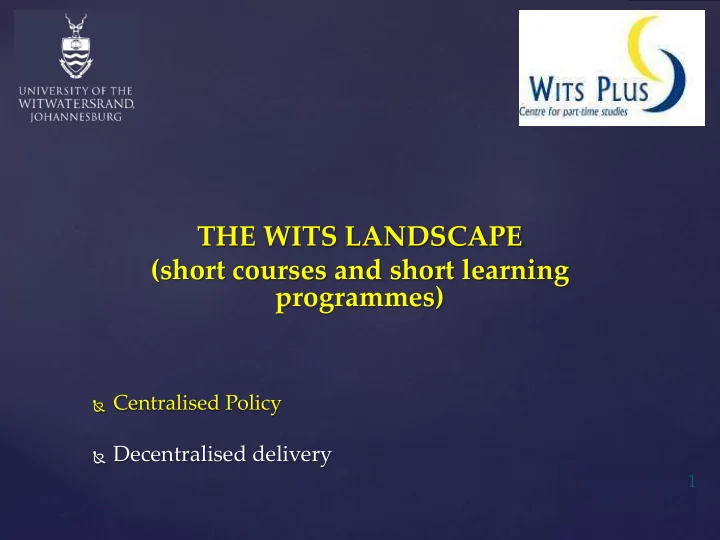

THE WITS LANDSCAPE (short courses and short learning programmes) Centralised Policy Decentralised delivery 1
Background Wits prior to 2001 consisted of 11 Faculties 137 Departments Today, Wits has five faculties (Commerce, Law & Management; Engineering & the Built Environment; Health Sciences; Humanities; Science) and 33 schools. This sees the emergence of the need for centralisation
Prior to 2005 Wits mainly issued Certificates of Competence or Certificates of Attendance At the time, these short courses did not have robust record management systems in place. At the time Teaching programmes at universities traditionally focused on undergraduate and postgraduate qualifications and, although short courses have been offered at Wits for a number of years, the growing demands for ongoing professional development and life-long learning require that the University revisit its policies and procedures to ensure that short courses offered at the University are relevant and of a high quality.
In 2006, Wits was audited by the HEQC One of the responsibilities of the HEQC as an ETQA is to report formally to SAQA on the quality management arrangements of its constituent providers in respect of the following: Training and development in assessment, Moderation of assessment, Short courses, Certification arrangements, and Recognition of Prior Learning (RPL). The outcome of the audit resulted in the delegation of short course quality assurance functions to the institution. This catalysed the development of a short course policy.
The purpose of the policy is to: highlight the importance of short course provision by the University; align short course provision with national policies, as well as with national and international good practice; ensure that there are adequate processes and systems to ensure that short course provision is of the highest quality; ensure that the provision of short courses does not unduly expose the University to legal, financial, reputation or other considerable risk; define the relationship of short courses with courses which lead to qualifications; define the relationship of short courses with teaching , learning, research and comm unit y engagement.
Governance and approval of short courses Before a short course may be offered, the requisite approvals must be obtained. Submissions for approval must be made using the format determined from time to time by the Academic Planning and Development Committee (APDC). A short course offered by an academic structure must be approved by the Faculty Board and reported to APDC. If a short course is not to be taught at the University, i.e. if it is to be offered away from the seat of the University whether elsewhere in South Africa or beyond its borders, the approval of APDC must be given. Such reporting must occur or approval be sought even if it is an existing short course e.g. if it is currently offered at the University but is proposed to be offered elsewhere. If a short course is proposed to be offered below NQF level 5, the approval of APDC must be so
Responsibility for Academic Quality of Short Courses As mentioned, the offering of short courses is an academic activity. The academic structure offering the short course is directly responsible for the academic quality of the course. Indirectly, academic staff and the academic committees into which they are organised (such as Faculty Boards) carry responsibility for the academic quality of short courses through being tasked with teaching, for example, or approval and review of short courses . Quality of the Course Administration including the booking, the payment, the information flow, as well as the administering and updating of evaluation questionnaires and on site evaluations as required Quality of the Material includes the course abstracts, the presentation material, the pre-course reading, the hand out material, and the timely updating and archiving of the latest material Quality of the Facilities including parking, security, ablution facilities and suitability of the venue Quality of the Hospitality including the refreshments and the timing and frequency of the breaks.
Record keeping and enrolment All short courses must be recorded on the dedicated short course computer system of the University. Monitoring of Course D elivery The monitoring of the delivery of short courses is a necessary part of the short course process. This will include the management and summary of the evaluation responses, periodic on site checks, and the electronic repository of all material and summaries.
Review and Re-Approval of Short Courses Review is regarded as an integral and essential part of the broader teaching process and therefore short courses must be reviewed regularly to ensure that the University continues to offer short courses which are both relevant and of high quality.
Recommend
More recommend